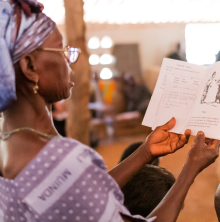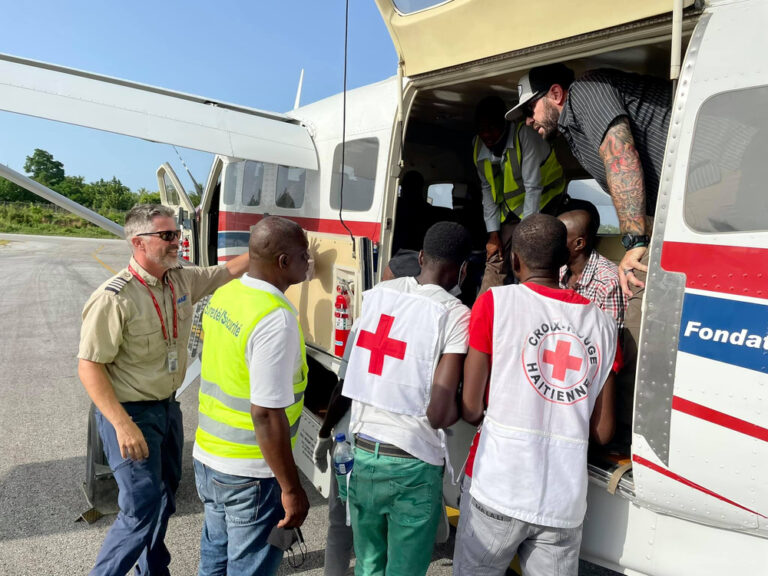MAF comes alongside those who have experienced unthinkable tragedy in the DRC
By Jeanelle Reider
You wouldn’t know it by Mama Celestine’s face.
As she enters her immaculate 7×10 foot mud hut, an infant strapped to her back, her serene smile warms up the room.
You wouldn’t know it from Papa Mambo either. He follows his wife into their home, ducking under the low tarp roof. His gentle voice fills the space with peace.
Their visitor glances at the bright-colored clothes strung along the wall and thinks, “There’s beauty here.”
You would never guess the ashes from which it rose.
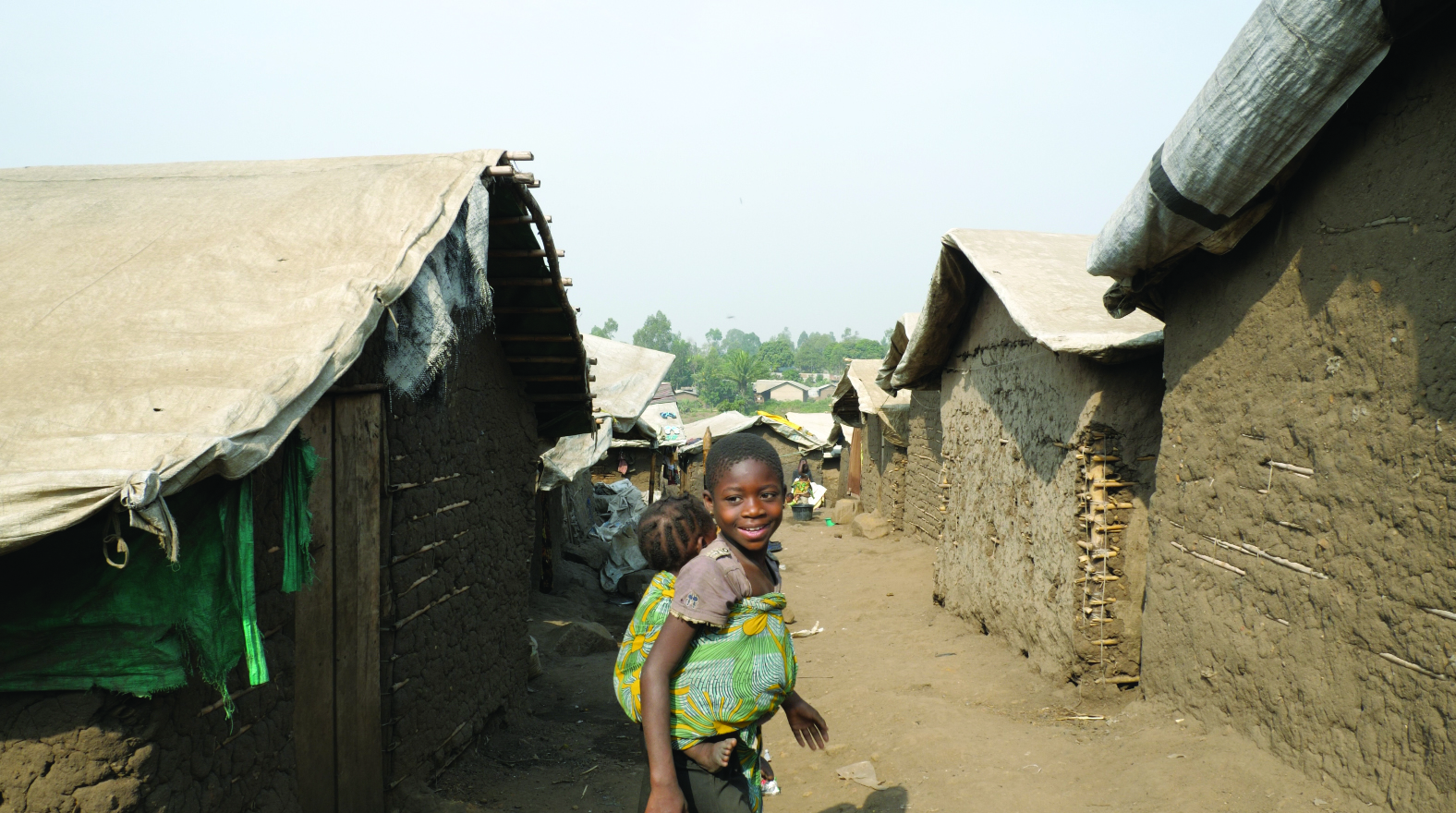
Violence comes near
In February of 2018, ash filled the skies near the eastern border of the Democratic Republic of the Congo (DRC).
Violence—fueled by a tangled mix of motivations—had once again visited the people. Scores were driven into the bush as their villages burned.
In the weeks that followed, thousands of people made their way to the city of Bunia, where makeshift camps sprang up overnight.
They arrived heartbroken, destitute, maimed.
As torrential downpours drenched the survivors, they stretched tarps over sticks anchored in oozing mud and wondered where their next bite of food would come from.
In the village of Nyankunde—an eight-minute MAF airplane flight away—staff serving in MAF’s East DRC program began raising funds to purchase and deliver food, firewood, and other essentials for the internally displaced people (IDPs). MAF chaplain Pastor Bisoke oversaw the buying of food and organized local church members to cook meals, while the team visited and brought encouragement.
Much of this was out of their comfort zone. And they questioned how effective MAF’s small efforts could be in the face of such overwhelming need.
But Pastor Bisoke distilled it down to this: “My heart is here with these vulnerable people. I want to suffer with them. I want to cry with them. This is the work God is sending me to do.”
God had brought the need into MAF’s “back yard.” What else could they do?
Still breathing
In the months that followed, town after town in the northeastern regions of Ituri and North Kivu succumbed to the onslaught of brutality.
Tché was one of those towns. Caught up in a wave of local massacres that began in June 2019, its houses were burned. Its health clinic was destroyed. Its people were mercilessly killed in a frenzied torrent of guns, knives, and machetes.
One day, Mama Celestine found herself lying among the dead.
Through a translator, she told her story. “They cut my arm. I collapsed among the dead people. Then when people came to bury the dead bodies, they found out that I was really not dead. They took me to the hospital, and they removed the arm that had been cut.”
Mama Celestine, Papa Mambo, and their five children eventually made it to one of the IDP camps in Bunia.
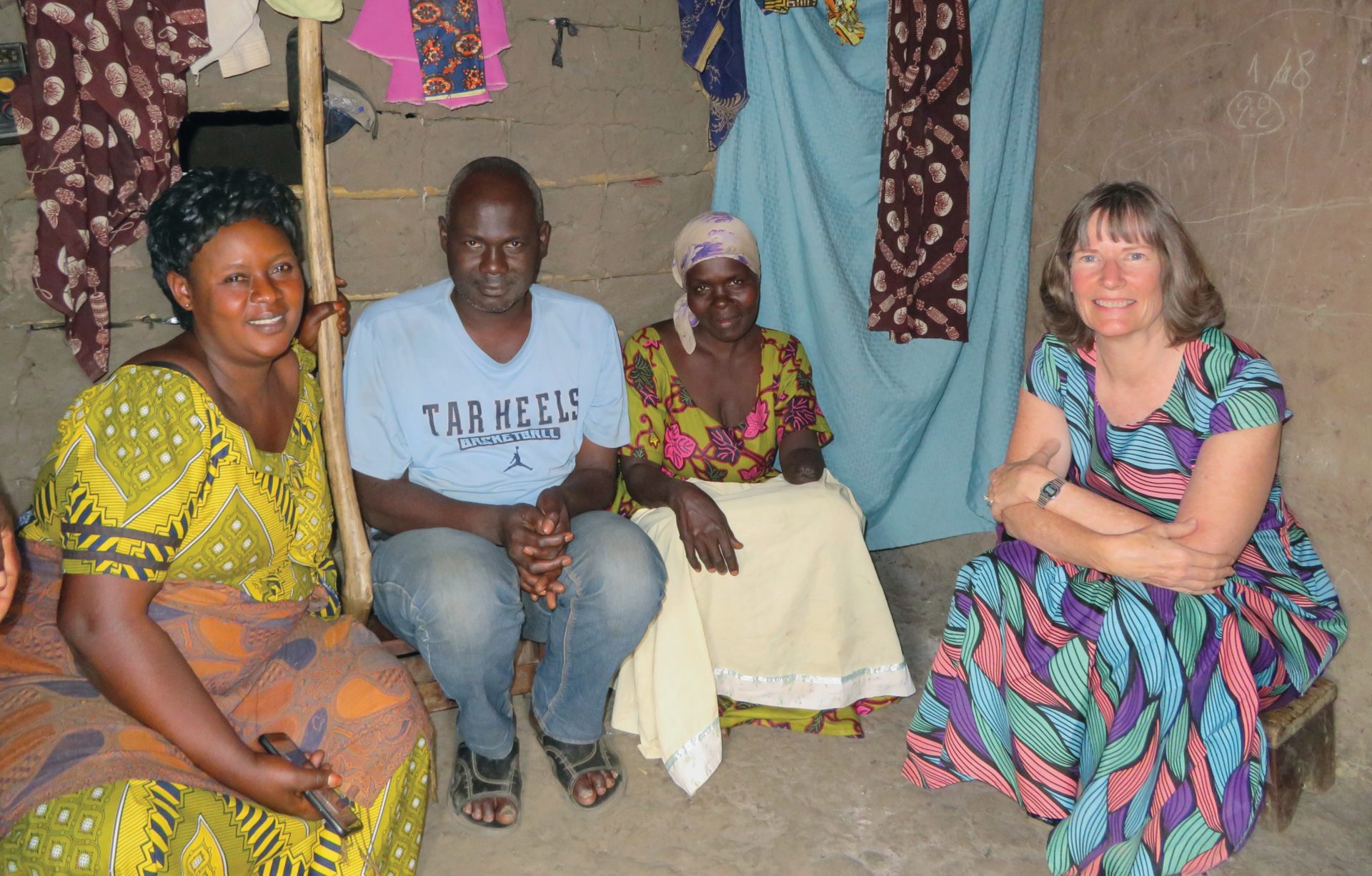
More than a stopgap
By the time Mama Celestine and her family arrived, a lot had changed in MAF’s ministry to the IDPs.
Pastor Bisoke and his MAF co-workers had hired sewing teachers and started a sewing class for women desperate for hope and a means to support their families. Through the generosity of U.S. churches and compassionate donors, MAF had purchased fabric, supplies, and sewing machines.
Seeing that no one else was addressing the trauma of the IDPs, they had also hired counselors to help minister to the emotional and spiritual needs of those traumatized by unimaginable atrocities. And they had built a wood-and-tin-roof building for the sewing and counseling activities.
Though humanitarian organizations had eventually stepped in to meet basic needs, MAF continued to provide supplemental food for malnourished children and pregnant women as well as simple medications to dispense through some of the counselors.
What had begun as a stopgap measure was starting to grow into a robust ministry in three separate camps in Bunia.
Forcing its way in
In the spring of 2021, the violence that had stormed into MAF’s “back yard” three years earlier now forced its way into the “house.”
On April 16, fighting broke out between the DRC military and local militia near the MAF base in Nyankunde. MAF pilots spent the next three days flying planeloads of expat missionary families and others to safety in Bunia. Then, MAF evacuated its own team as well.
Some of MAF’s Congolese staff—along with most of the 25,000 residents of Nyankunde—had already fled into the bush or to nearby villages. A few of the men courageously elected to stay in Nyankunde after the evacuation to help protect MAF property and be a presence of hope for the few villagers who remained.
Over the next few weeks, MAF made the difficult decision to relocate indefinitely to Bunia.
The Lord had kept all of our Congolese co-workers safe from physical harm, but many of them grieved the loss of crops and household belongings—besides the emotional trauma of having to process yet another occasion of violence, threats, and uncertainties that had continued since a horrific attack on Nyankunde in 2002.
The stories they could tell
Each displaced person who enters the camps in Bunia brings a story with them.
Some stories whisper God’s power and grace strong and clear above the mayhem of violence from which they’ve emerged:
- Murefu, whose 13-year-old son was shot and killed after an attack on his village, is now a respected leader of one of the smaller communities into which his camp is divided.
- Mama Vive steadfastly continues with the Lord after losing her husband, mother, and children in an attack on her home town. She credits her mental and emotional healing to the ministry of the MAF sewing class.
- Then there’s the ex-militia camp liaison who had a radical conversion to Christ and now, through the mentorship of Pastor Bisoke, is training to become a pastor.
Other stories still await God’s intervention. Desperate women who have turned to prostitution, stuck in a Catch-22 between self-preservation and self-respect. The vengeful who have stopped believing in a just God. The raped and abused cowering in fear.
The power of lament
With little formal education and an abundance of faith, the counselors—many of whom process tragedies of their own—willingly minister to each person God puts before them.
The trauma they seek to address is multilayered and complicated.
Annaliese Jacobsson, daughter-in-law of MAF’s East DRC program director Dave Jacobsson and his wife, Donna, traveled to the DRC in February. While there, she visited all three IDP camps where MAF is serving.
Annaliese has a master’s degree in social work, with a minor in refugee studies. Most of her clients in the U.S. are experiencing either complex trauma or short-term trauma.
She cites research that shows that trauma in IDP and refugee camps is not only past, it’s also current. People are not always welcome in their new community. Ethnic conflicts are still alive and well, even inside the camps. Women and girls who must venture far from their homes to find a bathroom and privacy are at risk for sexual violence.
Then there’s the social reality of family breakdown and domestic violence as people expend monumental effort simply staying alive.
During her visit, Annaliese presented a two-day trauma-focused training for the MAF counselors, sewing teachers, camp liaisons, and others. Her goal was to give them tools both for their work with the IDPs and for their own healing.
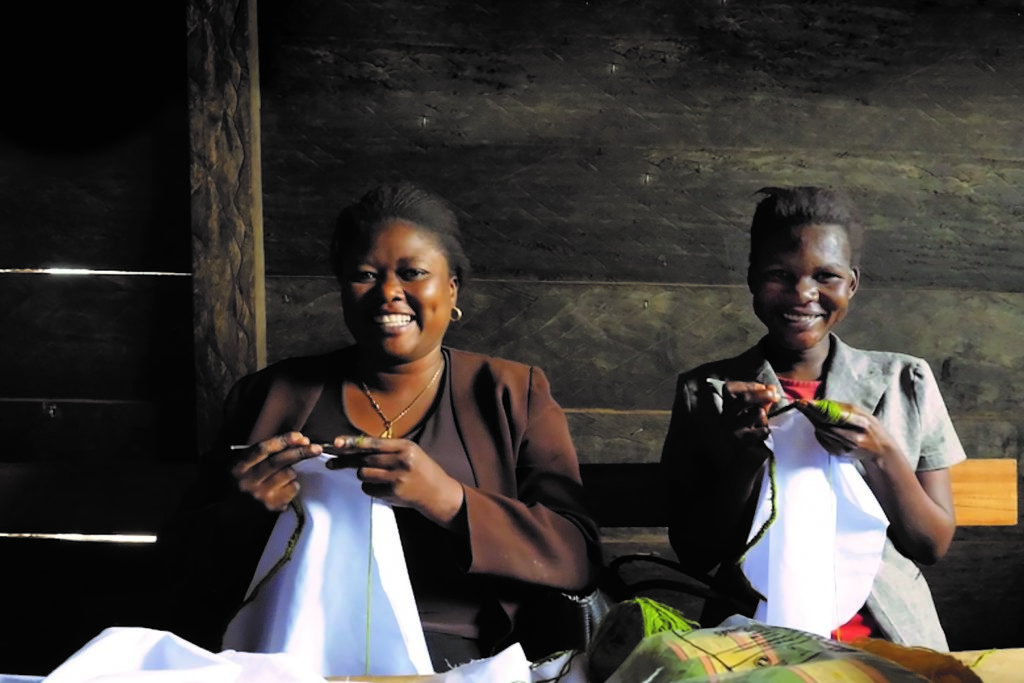
Part of the training focused on how to allow oneself to feel the pain while also being anchored in the love of God and in community.
Annaliese explained, “As Christians we have the practice of lament for a reason. The Psalms and Job and Jesus’ story give us really beautiful roadmaps on how to feel these things well, without being consumed by them to the point of despair.”
When asked what she would like readers of FlightWatch to understand, she answered that it can be very difficult for the western culture to sit in pain—it makes us uncomfortable. She hopes that people will “just remember. Remember that the conflict in Congo is not over.”
God of justice
Throughout the crisis, MAF staff have sought ways to creatively and compassionately demonstrate to those in distress, “We see you. We grieve with you. We look to Jesus with you.”
In December, MAF staff member Sheryl Strietzel shared information from Christian psychologist David Riddell’s “Living Wisdom” course during the IDP workers’ monthly retreat.
The group was reminded that, though life may not be fair and just, God is just. He sees, and He will vindicate. They absorbed the truth that cycles of retaliation can only be stopped when we see perpetrators of evil as victims held captive by Satan’s lies, and that only knowing the Truth (Jesus) can set them free.
These are difficult concepts for any wronged person to assimilate. How much more so for those who have experienced violence beyond what most of us can fathom?
Yet those who attended received the teaching with tender hearts. They left deeply encouraged and invited Sheryl to return for future presentations.
Can you see it?
Mama Celestine thanks her visitor, Sheryl, for coming to her home.
She stands up from the bench and, with her good arm, deftly tightens the ties around her baby. With the other, she props him in place.
She walks through the door and out into the sunlight, down the dirt road, past a circle of boys juggling a ball on the backs of their hands. She greets a young woman washing a garment in a metal bucket.
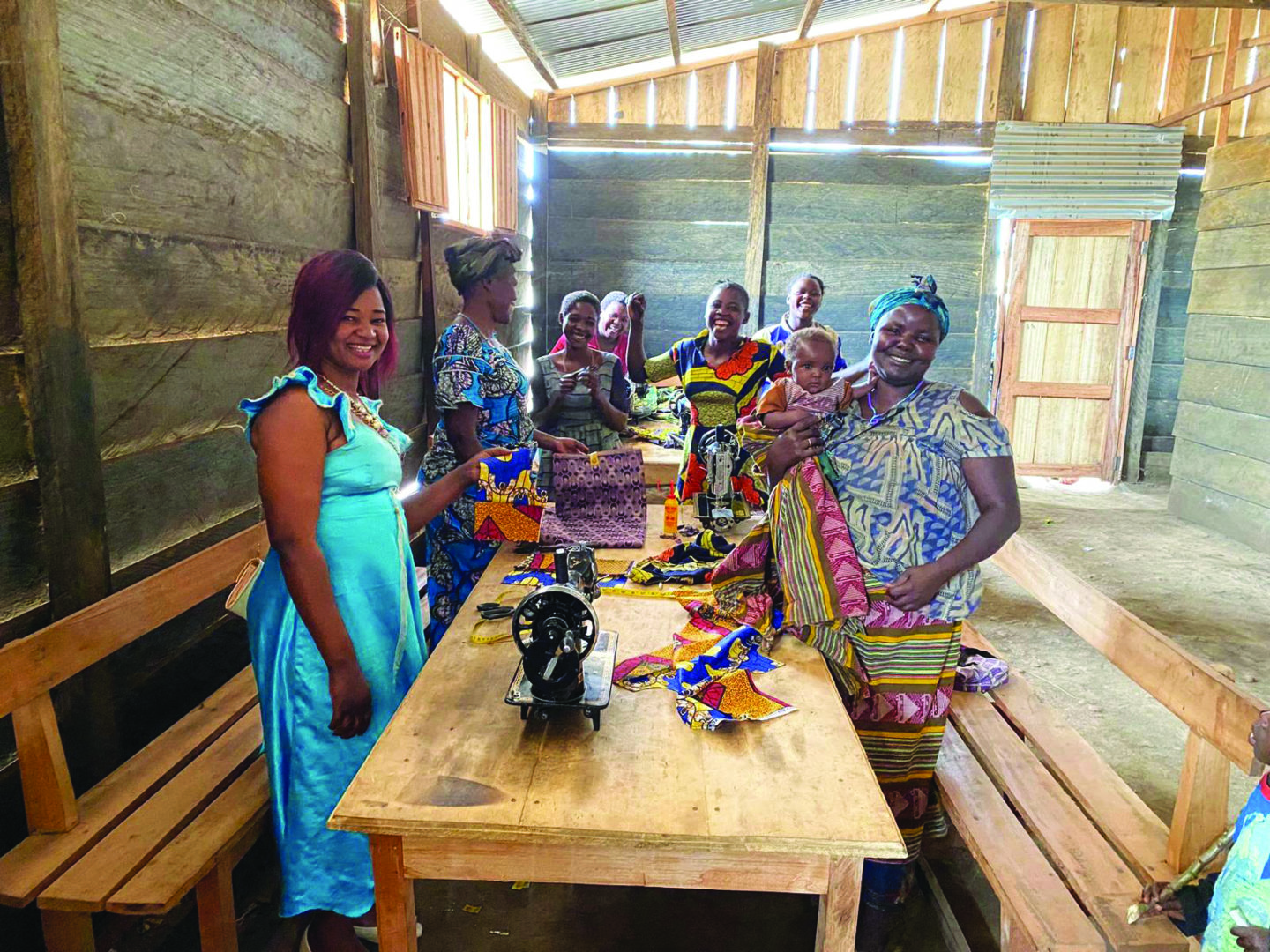
At a building marked “MISSION AVIATION FELLOWSHIP,” she stops. Even before she enters, she hears the happy banter.
Inside, women sit on wooden benches crocheting hunter green trim on white cloth swatches. Others pull bright-colored fabric through hand-cranked sewing machines.
The women make room for her, and Mama Celestine sees it on every face: Beauty, rising from ashes.
#
Story appeared in the FlightWatch Vol. 3 (summer) 2022 issue:

